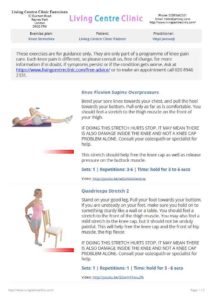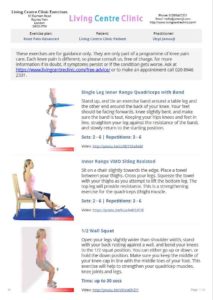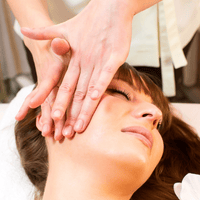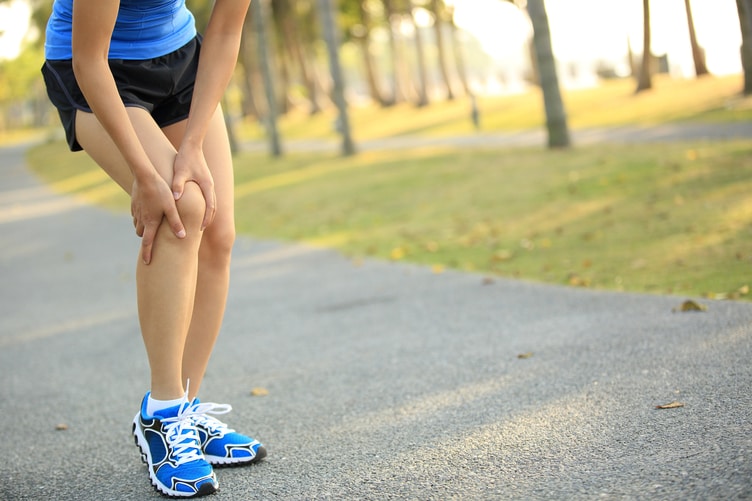
How to Fix Knee Pain Fast
Many people have taken to walking as a simple form of exercise. However even this simple exercise has led to patients visiting us at the Living Centre Clinic in Wimbledon, with knee pain. If you are suffering from knee pain discover how to fix knee pain fast, in the comfort of your own home.
Many years ago, when I qualified in the mid-1980s as an osteopath, I came across a string of older men suffering from acute low back pain. This was the first attack of back pain in their lives aged 60+ years, which seemed odd to me.
It turned out all these patients had open-heart surgery about 18-24 months earlier. I was at a loss to understand the connection. It turned out that following surgery, these men were exercising for the first time ever in their lives, taking up jogging.
Well, it's no coincidence to see the same pattern happening again.
The first Covid-19 lockdown took place around 18 months ago. Gyms and recreation centres were shut, so many had taken to walking for regular exercise, and many still have continued. Some had also put on weight during the lockdown and so started walking to burn off the fat.
We have seen a sharp rise in the number of people suffering from ‘front of knee' pain. This is knee pain without too much swelling and without a trauma event, ie twisting on a pavement, kicking a football, slipping on a step etc. Interestingly, this is quite different from the usual knee pain, ie grossly swollen knees, knees that locked up, gave way or couldn't bend.
Anterior Knee Pain
This pain is pain behind the kneecap. It is what the doctors and physiotherapists call anterior knee pain. Here the cartilage in the knee is usually intact and the ligaments are strong. It can be confusing to the general public as even the doctors find it difficult to define this condition. It is also known by other names such as chondromalacia patellae, patellar mal-tracking, patella tendonitis, patellofemoral pain, runners knee, plica syndrome etc. They all have one thing in common – an overuse of the knee causing pain, swelling and difficulty moving. There are iof course subtle variations in the terms, but as said broadly they are all a result of over-use of some sort.
Symptoms of Anterior Knee Pain
As a person exercises, walks or runs, the knee cap rubs against the leg bone in simple terms. Over time this causes the underside of the kneecap to injure and hurt. When the kneecap rubs on the leg bone it causes soreness, varying amounts of swelling, tenderness, difficulty moving. Of course it is painful as the bones are literally being rubbed together. Eventually it can hurt ‘all the time' ie going downstairs is painful, first thing in the morning it can often be sore, getting up from sitting can hurt and eventually it can be painful whilst walking.
Anatomy of the knee joint side view.
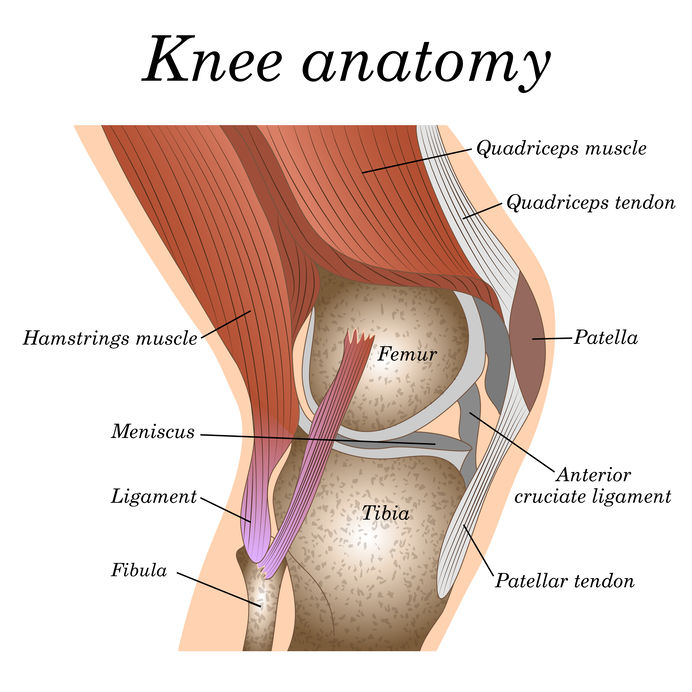
Anatomy of the knee joint side view.
Knee Pain Treatment
There are many causes of front to knee pain, not just overuse (ie knee pain can arise from problems relating to the foot, ankle, hip or low back). So if in doubt please see – USE THIS LINK FOR A PERSONAL REPLY.
Knee Pain Exercises
The main principle is if you are new to exercise, do not exercise every day. This is especially true for most people aged 40 plus years old, those who have not really exercised before, and if you are recovering from an injury.
How to Rest the Knee
Let's take the example of the hardest working muscle in our body, the heart. Each day it beats an amazing over 100,000+ times without getting tired. One of the reasons it can do this is because it takes a rest that is longer than the time it spent beating. If you are starting out exercising, we recommend walking no more than 2 – 4 times a week, and that too, about 55-70% of what you feel you could do. So if your walks were one hour before, limit it to no more than 35 minutes during recovery.
Knee Pain Recovery
In terms of recovery time there is the principle in medicine that if a pain took 18 months to occur, it may take a similar time to recover. However with treatment, medicines and rest this can be significantly shortened. This time-line applies not just to knee pain, but also to other mechanical conditions, including back pain, slipped discs, shoulder injuries, neck pain, etc. That's why we say always seek help sooner to reduce the recovery and healing time.
Knee Pain Tips
Here are some tips to help you self-manage at home and some easy exercises you can do.
*Use a cold pack (not ice) over the knee to help reduce the bruising of the knee bone. Avoid heat as that may increase inflammation. You can also take a 1 – 3 days course of ibuprofen (if you are allowed to do so) to get healing boosted. Ibuprofen takes swelling down very fast, so the healing can start sooner.
*Before getting out of a chair, wake up the knee – ie flex and bend it several times first. This helps get the kneecap back in it's groove.
*Avoid standing or walking for long periods. Static pressure builds on the kneecap.
*Lying still for too long also results in stiffness. That's why first thing in the morning it can be at it's worst. That said it will be the last thing to get better, so don't worry too much if it is at it's worst first thing in the morning it will get better.
*You may find it helpful to put a pillow under the knee at night. But when better discard the pillow, as overuse will lead to other knee problems.
*Best to walk on grass, ideally uneven grass, like in the woods or on a common. The small variation in terrain will help use different muscles. If your knee is up to it, walking up and down hills is also a great idea. The idea is to introduce movement variety.
*When walking try and stride out more. Stretching the stride longer (ie to stretch out the hip flexor) can help free the pressure on the kneecap. This is because the hip flexor operates over two joints: the hip and the knee. By loosening the flexor, it helps take pressure off the knee.
Knee Pain Damage
Pain is your friend! The body can only injure or health at any given moment. It cant do the two at the same time. This means when you are re-injuring the knee, not only it hurts, but it puts healing on the back-burners. So pain means you are creating more damage, collateral damage, and more making good to do, requiring a longer healing cycle.
For this reason we always ask patients to make a list of movements that cause pain and then avoid those whilst healing is taking place. This gives the healing cycle a good chance to complete it's work. Such a list of things to avoid may include, going down the stairs, walking on concrete, running, tennis, golf, squatting, kneeling, twisting the knee. There is no point the body taking 3 steps forward and the patient taking 2 steps backward. We know we want to be like we were before the pain came, but we need to be patient. Extra care is needed at this time.
Professional help for Knee Pain
Your osteopath, physiotherapist or chiropractor may prescribe a knee brace to help stabilise the kneecap. We may also tape up the knee cap. This is so it does not move around too much – reducing friction and helping it heal.
As osteopaths we also look at the back, hip and ankle joints. Restrictions of problems here can also be a cause extra work on the knee. We use functional exercises to help improve the dynamics of these areas, which can help you get back on your feet faster.
Knee Pain Exercises
The kneecap needs space to breathe. When the pain arises muscles do the only thing they can do, and they tighten up to try and protect the knee. Beyond a certain point it becomes counter-productive and the tightness of the knee causes the kneecap to press against the leg bone. So stretching the thigh muscle (quadriceps) will help give the kneecap space to breathe and heal.
Knee Pain Stretches
Download my top stretches:
Next we need to help the muscle get stronger. Often if you stand in the mirror, you may notice the thigh muscle over the hurting knee is smaller. As an osteopath we see this time and time again. We know for the knee to be happy the muscle has to be “fully grown”. When you are out of the first phase of pain, these muscle strengthening exercises will help.
Knee Pain Strength Exercises
Download my top muscle strengthening exercises:
Get back to what matters to you
Healing is a balance between movement and rest, as well as treatment and advice. We work hard to provide you with everything you need to heal fast and heal independently. Vispi Jamooji

Ask me your question
Fill in a form click here
Email me click here
Fill in form to opposite receive articles just like this when they are published.
– fill in the optional section to get discounts / offers on our treatments.
Vispi Jamooji DO PG Cert SPOP
Registered Osteopath (London, 1986)
Specialist Paediatric Osteopath & Cranial Osteopath
Living Centre Clinic
32 Durham Road, Raynes Park, London SW20 0TW
better@livingcentreclinic.com
020 8946 2331

